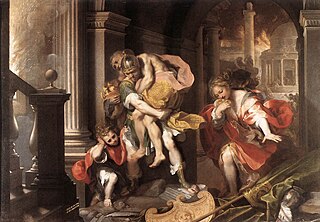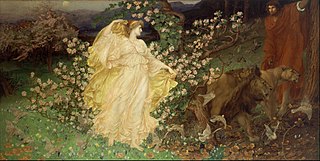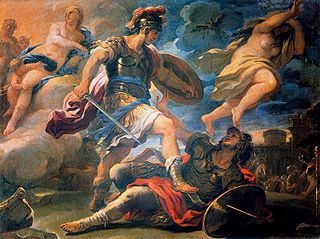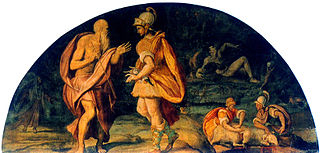History
The development of European classical literature out of the common stock of oral tradition proved conducive to reworkings, revisions, and satires. Numerous writers of Greece's golden age revived and reworked stories of the Trojan War and Greek mythology, although they were not strictly continuators as, for the most part, they did not invent or even extrapolate much from the received stories, choosing to alter the tone and treatment rather than the stories.
Latin literature, on the other hand, may be regarded as systematic continuators of Greek models. The pinnacle of Augustan literature, the Aeneid , is essentially a continuation of the Iliad : not only in that it follows a minor character from his imagined origins in Troy to his founding of Rome, but in that it continues a historical ethos. This move, by connecting the Roman empire both culturally and pseudo-historically to the Homeric myth, is commonly viewed as a move by Virgil to legitimize the Roman empire. For instance, the epic opens with a summary of the progress of Aeneas and his progeny (in John Dryden's translation):
Arms, and the man I sing, who, forc'd by fate,
And haughty Juno's unrelenting hate,
Expel'd and exil'd, left the Trojan shore.
Long labors, both by sea and land, he bore,
And in the doubtful war, before he won
The Latian realm, and built the destin'd town;
His banish'd gods restor'd to rites divine,
And settled sure succession in his line,
From whence the race of Alban fathers come,
And the long glories of majestic Rome.
W. A. Camps expresses this common analysis of Virgil when he writes, "There is more than one reminder in the poem that its hero Aeneas is ancestor of Octavian through the supposed descent of the Julii [i.e., Octavian's family] through Aeneas' son Julius."
Like their medieval predecessors, Renaissance authors drew inspiration from earlier writers. More significantly, the spread of printing, slow increase in literacy, and the development of capitalism conspired to shape a modern concept of text and authorship. In this context, one sees "continuators" in the modern sense: authors either inspired or hired to complete or continue a predecessor's concept. This habit was most noticeable in the most commercialized spheres of literature. Elizabethan drama, for example, is full of examples. As an instance of completion, Francis Godolphin Waldron completed The Sad Shepherd , a late unfinished play by Ben Jonson. As an instance of sequel-writing, John Fletcher's The Tamer Tamed continues and lampoons Shakespeare's The Taming of the Shrew . Controversial literature was amenable to such continuations, as evidenced most especially by the Martin Marprelate affair; Philip Sidney's Arcadia was continued by Anna Weamys.

In Greco-Roman mythology, Aeneas was a Trojan hero, the son of the Dardanian prince Anchises and the Greek goddess Aphrodite. His father was a first cousin of King Priam of Troy, making Aeneas a second cousin to Priam's children. He is a minor character in Greek mythology and is mentioned in Homer's Iliad. Aeneas receives full treatment in Roman mythology, most extensively in Virgil's Aeneid, where he is cast as an ancestor of Romulus and Remus. He became the first true hero of Rome. Snorri Sturluson identifies him with the Norse god Víðarr of the Æsir.

Publius Vergilius Maro, usually called Virgil or Vergil in English, was an ancient Roman poet of the Augustan period. He composed three of the most famous poems in Latin literature: the Eclogues, the Georgics, and the epic Aeneid. A number of minor poems, collected in the Appendix Vergiliana, were attributed to him in ancient times, but modern scholars consider his authorship of these poems to be dubious.

The Aeneid is a Latin epic poem that tells the legendary story of Aeneas, a Trojan who fled the fall of Troy and travelled to Italy, where he became the ancestor of the Romans. Written by the Roman poet Virgil between 29 and 19 BC, the Aeneid comprises 9,896 lines in dactylic hexameter. The first six of the poem's twelve books tell the story of Aeneas' wanderings from Troy to Italy, and the poem's second half tells of the Trojans' ultimately victorious war upon the Latins, under whose name Aeneas and his Trojan followers are destined to be subsumed.
In Greek mythology and history, there were at least eleven men named Medon.

In Roman mythology, Evander was a culture hero from Arcadia, Greece, who was said to have brought the Greek pantheon, laws, and alphabet to Italy, where he founded the city of Pallantium on the future site of Palatine Hill, Rome, sixty years before the Trojan War. He instituted the festival of the Lupercalia. Evander was deified after his death and an altar was constructed to him on the Aventine Hill.

Anchises was a member of the royal family of Troy in Greek and Roman legend. He was said to have been the son of King Capys of Dardania and Themiste, daughter of Ilus, who was son of Tros. He is most famous as the father of Aeneas and for his treatment in Virgil's Aeneid. Anchises' brother was Acoetes, father of the priest Laocoön.

Turnus was the legendary King of the Rutuli in Roman history, and the chief antagonist of the hero Aeneas in Virgil's Aeneid.
In Roman mythology, the Aeneads were the friends, family and companions of Aeneas, with whom they fled from Troy after the Trojan War. Aenides was another patronymic from Aeneas, which is applied by Gaius Valerius Flaccus to the inhabitants of Cyzicus, whose town was believed to have been founded by Cyzicus, the son of Aeneas and Aenete. Similarly, Aeneades was a patronymic from Aeneas, and applied as a surname to those who were believed to have been descended from him, such as Ascanius, Augustus, and the Romans in general.
According to the medieval poet Jean Bodel, the Matter of Rome is the literary cycle of Greek and Roman mythology, together with episodes from the history of classical antiquity, focusing on military heroes like Alexander the Great and Julius Caesar. Bodel’s division of literary cycles also included the Matter of France and the Matter of Britain. The Matter of Rome includes the Matter of Troy, consisting of romances and other texts based on the Trojan War and its legacy, including the adventures of Aeneas.

Marcus Claudius Marcellus was the eldest son of Gaius Claudius Marcellus and Octavia Minor, sister of Augustus. He was Augustus' nephew and closest male relative, and began to enjoy an accelerated political career as a result. He was educated with his cousin Tiberius and traveled with him to Hispania where they served under Augustus in the Cantabrian Wars. In 25 BC he returned to Rome where he married his cousin Julia, who was the emperor's daughter. Marcellus and Augustus' general Marcus Vipsanius Agrippa were the two popular choices as heir to the empire. According to Suetonius, this put Agrippa at odds with Marcellus, and is the reason why Agrippa traveled away from Rome to Mytilene in 23 BC.

A katabasis or catabasis is a journey to the underworld. Its original sense is usually associated with Greek mythology and Classical mythology more broadly, where the protagonist visits the Greek underworld, also known as Hades. The term is also used in a broad sense of any journey to the realm of the dead in other mythological and religious traditions. A katabasis is similar to a nekyia or necromancy, where someone experiences a vision of the underworld or its inhabitants; a nekyia does not generally involve a physical visit, however. One of the most famous examples is that of Odysseus, who performs something on the border of a nekyia and a katabasis in book 11 of The Odyssey; he visits the border of the realms before calling the dead to him using a blood ritual, with it being disputed whether he was at the highest realm of the underworld or the lowest edge of the living world where he performed this.

In Greek and Roman mythology, Nisus and Euryalus are a pair of friends and lovers serving under Aeneas in the Aeneid, the Augustan epic by Virgil. Their foray among the enemy, narrated in book nine, demonstrates their stealth and prowess as warriors, but ends as a tragedy: the loot Euryalus acquires attracts attention, and the two die together. Virgil presents their deaths as a loss of admirable loyalty and valor. They also appear in Book 5, during the funeral games of Anchises, where Virgil takes note of their amor pius, a love that exhibits the pietas that is Aeneas's own distinguishing virtue.
In Greek mythology, the name Ilioneus may refer to:

Polydorus or Polydoros is the youngest son of Priam in the mythology of the Trojan War. While Homer states his mother is Laothoe, later sources state his mother is Hecuba. Polydorus is an example of the fluid nature of myth, as his role and story vary significantly in different traditions and sources.

Augustan literature refers to the pieces of Latin literature that were written during the reign of Caesar Augustus, the first Roman emperor. In literary histories of the first part of the 20th century and earlier, Augustan literature was regarded along with that of the Late Republic as constituting the Golden Age of Latin literature, a period of stylistic classicism.
In Greek and Roman mythology, Salius is an Acarnanian who in one alternative tradition was the legendary founder of the ancient Roman priesthood of the Salii.
The Aeneid has been analyzed by scholars of several different generations and schools of thought to try to determine the political commentary that Virgil had hoped to portray. The major schools of thought include the overarching idea that Virgil had written a story that parallels Roman history at the time it was written as well as messages both in support of and against the rule of Augustus Caesar. Finally, it has been argued that Virgil had a stance on geopolitics which he conveys in the actions of Aeneas and his crew.

Philip Russell Hardie, FBA is a specialist in Latin literature at the University of Cambridge. He has written especially on Virgil, Ovid, and Lucretius, and on the influence of these writers on the literature, art, and ideology of later centuries.
In Greek mythology, Alcander or Alcandrus (Ancient Greek: Ἄλκανδρος may refer to the following characters:

Corynaeus is the name of one or more characters in Virgil's Aeneid (29–19 BCE). The first mention of Corynaeus in the poem is as a Trojan follower of Aeneas, who performs funerary rites for Misenus. Characters of the same name are then specified both as being killed by an archer, and later fighting in the final battle. This apparent contradiction is often explained by defining these as two separate characters.












